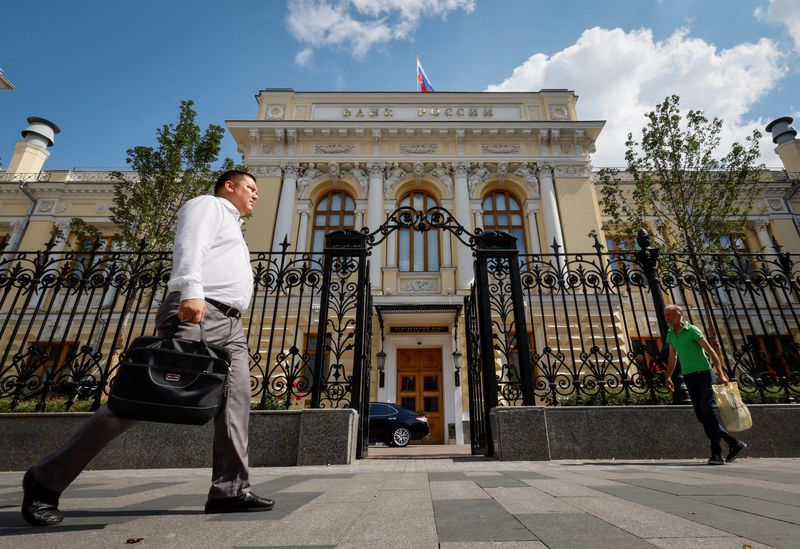By Alexander Marrow, Elena Fabrichnaya and Vladimir Soldatkin
MOSCOW (Reuters) -The Bank of Russia hiked interest rates by a higher than expected 200 basis points to 15% on Friday, raising borrowing costs for the fourth meeting running in response to a weak rouble, stubborn inflation and increasing budget spending.
The central bank has raised rates by 750 basis points since July, including an unscheduled emergency hike in August as the rouble tumbled past 100 to the dollar and the Kremlin called for tighter monetary policy.
"Current inflationary pressures have significantly increased to a level above the Bank of Russia's expectations," it said in a statement, pointing to domestic demand outpacing the provision of goods and services, and high lending growth.
Governor Elvira Nabiullina said the bank had also considered hiking by 100 or 150 basis points, and said the rate could be held or raised further this year. The next meeting is scheduled for Dec. 15.
Nabiullina also said the budget was a significant factor in Friday's decision.
Russia is increasing government spending, pouring cash into the defence sector to ramp up military production and prosecute what it calls its "special military operation" in Ukraine.
"The updated medium-term parameters of fiscal policy assume a slower than expected decline in fiscal stimulus in the years ahead," the bank said.
The bank also acknowledged for the first time that it may not succeed in returning inflation to its 4% target next year, forecasting year-end inflation for 2024 at 4-4.5%.
"It looks like today's interest rate hike front-loaded the tightening cycle in response to the fiscal announcements earlier this month," said Liam Peach, senior emerging markets economist at Capital Economics.
The majority of analysts polled by Reuters had expected a hike to 14%. The rouble leapt to a more than six-week high against the dollar after the decision.
PEAK RATES?
The central bank's tightening cycle began this summer when inflationary pressure from a tight labour market, strong consumer demand and the budget deficit was compounded by the falling rouble.
Russia had gradually reversed an emergency hike to 20% which it made in February 2022 after Moscow sent its troops into Ukraine, prompting sweeping Western sanctions. Rates were as low as 7.5% earlier this year.
The central bank said inflation would range from 7.0-7.5% in 2023. It had previously forecast year-end inflation at 6.0-7.0%. Annual inflation was running at 6.38% as of Oct. 16.
The bank maintained its hawkish stance, stating that tight monetary conditions would be maintained for a long period, but withdrew guidance that it would study the need for further hikes. Nabiullina described the signal as neutral.
But the bank set its 2023 key rate range at 15-15.2%, suggesting rates could climb further and Nabiullina said that may be required. In 2024, the rate is seen at 12.5-14.5%.
"At recent meetings, we raised the key rate by tangible steps and will be ready to do this again if we do not see signs of a sustainable slowdown in inflation and a cooling of inflation expectations," Nabiullina said.
Analysts were divided on what might come next.
"We have not reached the limit on the rate," said Dmitry Polevoy, head of investment at Locko-Invest. The bank has left the door open to December tightening, but is uncertain as to what the situation will look like then, he said.

Sinara Investment Bank analyst Sergei Konygin said the lack of forward hawkish guidance meant it was highly likely the key rate had already reached its upper boundary.
"I think the rate has peaked," he said.